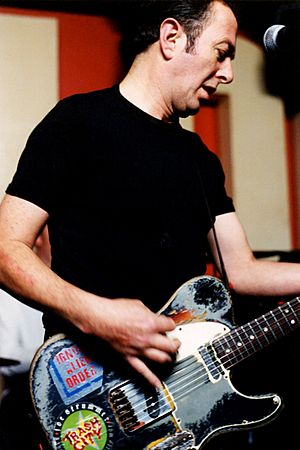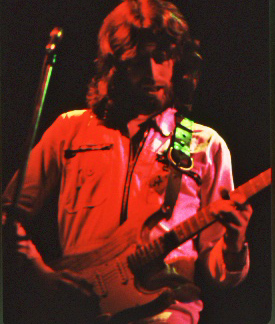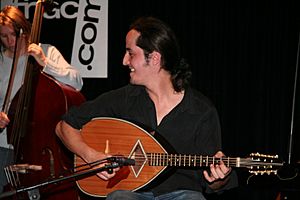Rachid Taha facts for kids
Quick facts for kids
Rachid Taha
|
|
|---|---|
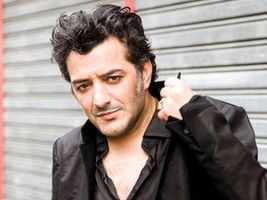
Taha in 2011
|
|
| Background information | |
| Native name |
رشيد طه
|
| Born | 18 September 1958 Sig or Oran, French Algeria |
| Died | 12 September 2018 (aged 59) Les Lilas, Île-de-France, France |
| Genres | |
| Occupation(s) |
|
| Years active | 1980–2018 |
| Labels | |
Rachid Taha (Arabic: رشيد طه; 18 September 1958 – 12 September 2018) was an Algerian singer and activist. He lived in France for most of his life. His music was known for being "sonically adventurous," meaning he liked to try new sounds. He mixed many styles like rock, electronic, punk, and raï music.
Contents
Early Life and Music Beginnings
Rachid Taha was born on September 18, 1958. He was born in Sig, Algeria, or possibly in the city of Oran. Oran is famous as the "birthplace of raï" music. In 1968, when he was ten, Taha moved to France with his family. They settled near the city of Lyon.
His father worked long hours in a textile factory. Rachid started working at 17 in a heating plant. He didn't like this job much. But at night, he was a club DJ. He played Arabic music, rap, salsa, and funk. He played "anything else that took his fancy," meaning anything he liked.
In the late 1970s, Taha opened his own nightclub. It was called The Rejects (or Les Refoulés in French). There, he would mix classic Arabic pop songs. He played them over beats from bands like Led Zeppelin and Kraftwerk.
Music Career
Raï Music Roots
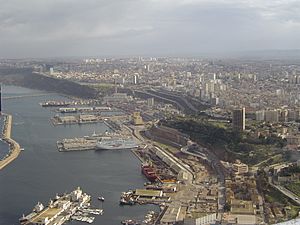
In the 1980s, a type of Algerian pop music called raï became popular worldwide. Raï music started as city music inspired by country styles. It became a way for young people to express their feelings. Taha felt that Algerian music and rock music were very similar. He was also inspired by the Moroccan band Nass El Ghiwane. People called them "Morocco's answer to the Beatles."
Carte de Séjour Band
In 1981, Taha met Mohammed and Mokhtar Amini in Lyon. They formed a rock band in 1982. They called it Carte de Sejour, which means Residence Permit or Green Card. Taha was the lead singer. He sang mostly in Arabic, but also in French.
Taha believed his early songs helped inspire the band The Clash. They later wrote their famous song "Rock the Casbah."
The band faced challenges. Some record stores didn't want to sell their music. They thought it would bring Arab customers into their shops. The band didn't make much money. Taha had to work other jobs, like painting houses or selling encyclopedias.
One of their famous songs was "Sweet France" (Douce France). It was originally a patriotic French song. Taha kept the lyrics but sang it with "furious irony." This made some French listeners upset. His version was even banned from French radio. But the song still got him noticed as a serious artist. His song "Voilà, Voilà" also spoke out against racism.
The band released their first album, Carte De Séjour, in 1983. In 1984, they worked with British guitarist Steve Hillage. This helped them create a "sharp, driving sound" for their album Rhoromanie. Taha wrote songs about being an Algerian immigrant in France. He sang about feeling like an outsider. The band broke up in 1989.
Solo Music Career
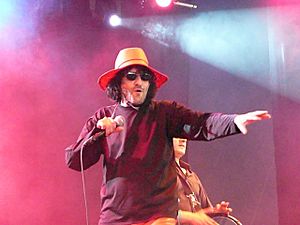
In 1989, Taha moved to Paris to start his solo career. He mixed many instruments and styles in his music. He used a drum called a doumbek for Arabic-style beats. His album Barbès didn't sell well in the United States. This might have been because Americans weren't keen on Arabic-sounding music during the first Gulf War.
In 1993, Taha worked with Steve Hillage again. Hillage helped produce his second solo album, Rachid Taha. Hillage helped Taha connect with his "north African roots." Hillage worked on nine of Taha's solo albums. In 1995, Taha released Olé Olé. For this album, he dyed his hair blond and wore blue contact lenses. He did this to make a point about prejudice against Arabs.
In 1997, his song "Ya Rayah" became a big hit.
In 2001, Taha released Made in Medina. Critics praised his wide range of instruments and amazing singing. The album was recorded in Paris, New Orleans, and London.
Taha's most successful solo album was Diwân. It featured new versions of old Algerian and Arab songs. He used traditional instruments like the oud. But he also added modern beats and samples.
His album Tékitoi, released in 2004, brought him more fame. The title means "Who the Hell Are You?" in street slang. The music reminded some critics of Joe Strummer from The Clash. In 2005, Taha performed with famous musicians like Robert Plant and Brian Eno. He covered The Clash's song "Rock the Casbah". He renamed it "Rock El Casbah." This song was in a 2007 film about Joe Strummer. Taha performed "Rock El Casbah" with Mick Jones from The Clash.
In 2008, Taha became even more well-known. He performed with the band Dengue Fever. He was part of "Africa Express," a project to highlight African musicians. He also performed with Nigerian artists Femi Kuti and Seun Kuti. He played with Brian Eno in an anti-war concert.
In 2009, Taha released Bonjour. This album was produced by Gaëtan Roussel. Some critics felt the music was calmer and more "commercial." In 2010, Taha played to large crowds in Toronto, Canada. His song "Habina" was in the 2010 film, It's Kind of a Funny Story. The famous guitarist Carlos Santana recorded Taha's song Migra. It sold over 25 million copies.
In 2013, Taha released the album Zoom. It was produced by Justin Adams. It featured guests like Mick Jones and Brian Eno. The album included a new version of "Voilà, Voilà." Taha also recorded "Now or Never," a song made famous by Elvis Presley.
Taha's Songs in Movies and Games
Many of Rachid Taha's songs have been used in films and video games:
- "Barra Barra" from Made in Medina was in the 2001 film Black Hawk Down. It was also in the trailer for the game Far Cry 2 and the 2007 film The Hunting Party.
- "Garab" from Made in Medina was used in the movie The Truth About Charlie (2002) and Blood and Chocolate (2007).
- "Ya Rayah" from Carte Blanche (Rachid Taha album) was used in the movie Something New (film) (2006).
Personal Life and Passing
Rachid Taha was known for being friendly and outgoing. He loved to party and had many friends from different backgrounds. He once said, "I've never wanted to just stay in my own neighborhood, my own community... You have to be adventurous."
Taha had a health condition called Chiari malformation since 1987.
Rachid Taha passed away from a heart attack in his sleep on September 12, 2018. This was just six days before his 60th birthday. He is survived by his partner Véronique Pré and their son, Lyes. An album he finished before his death, Je suis Africain, was released in September 2019.
|
See also
 In Spanish: Rachid Taha para niños
In Spanish: Rachid Taha para niños


